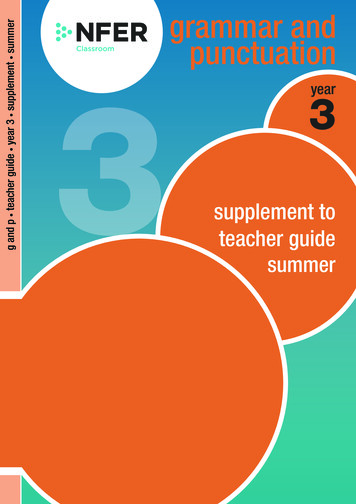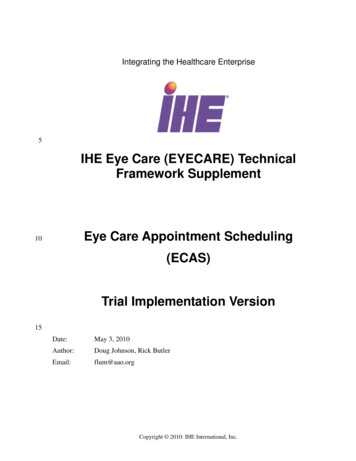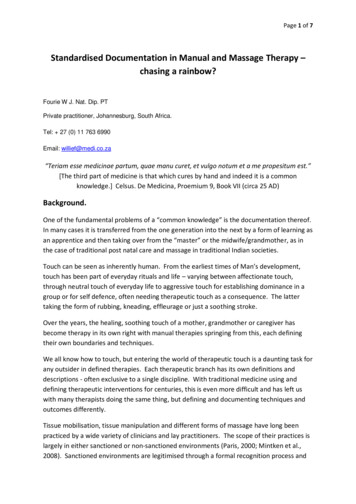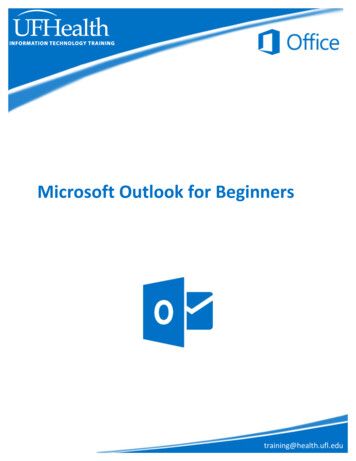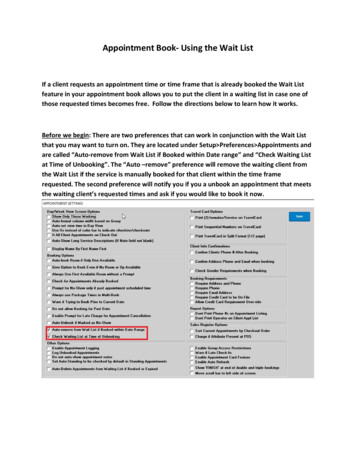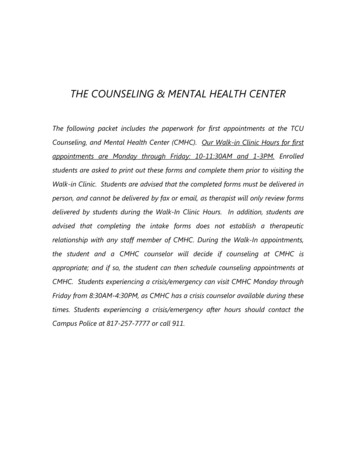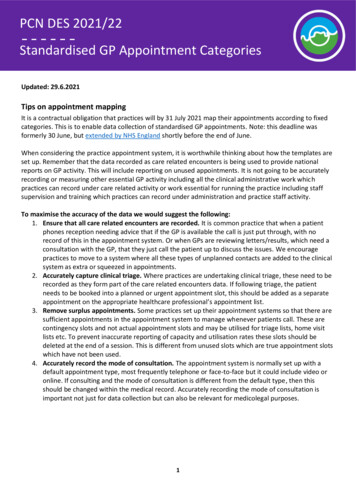
Transcription
PCN DES 2021/22 Standardised GP Appointment CategoriesUpdated: 29.6.2021Tips on appointment mappingIt is a contractual obligation that practices will by 31 July 2021 map their appointments according to fixedcategories. This is to enable data collection of standardised GP appointments. Note: this deadline wasformerly 30 June, but extended by NHS England shortly before the end of June.When considering the practice appointment system, it is worthwhile thinking about how the templates areset up. Remember that the data recorded as care related encounters is being used to provide nationalreports on GP activity. This will include reporting on unused appointments. It is not going to be accuratelyrecording or measuring other essential GP activity including all the clinical administrative work whichpractices can record under care related activity or work essential for running the practice including staffsupervision and training which practices can record under administration and practice staff activity.To maximise the accuracy of the data we would suggest the following:1. Ensure that all care related encounters are recorded. It is common practice that when a patientphones reception needing advice that if the GP is available the call is just put through, with norecord of this in the appointment system. Or when GPs are reviewing letters/results, which need aconsultation with the GP, that they just call the patient up to discuss the issues. We encouragepractices to move to a system where all these types of unplanned contacts are added to the clinicalsystem as extra or squeezed in appointments.2. Accurately capture clinical triage. Where practices are undertaking clinical triage, these need to berecorded as they form part of the care related encounters data. If following triage, the patientneeds to be booked into a planned or urgent appointment slot, this should be added as a separateappointment on the appropriate healthcare professional’s appointment list.3. Remove surplus appointments. Some practices set up their appointment systems so that there aresufficient appointments in the appointment system to manage whenever patients call. These arecontingency slots and not actual appointment slots and may be utilised for triage lists, home visitlists etc. To prevent inaccurate reporting of capacity and utilisation rates these slots should bedeleted at the end of a session. This is different from unused slots which are true appointment slotswhich have not been used.4. Accurately record the mode of consultation. The appointment system is normally set up with adefault appointment type, most frequently telephone or face-to-face but it could include video oronline. If consulting and the mode of consultation is different from the default type, then thisshould be changed within the medical record. Accurately recording the mode of consultation isimportant not just for data collection but can also be relevant for medicolegal purposes.1
PCN DES 2021/22 Standardised GP Appointment CategoriesPurpose of mapping exerciseNHSE/I, in partnership with NHS Digital, has introduced a new set of GP appointment categories (fullguidance), intended to better capture general practice workload and demand. Practices need to undertakea short one-off exercise to map each appointment slot type they use to one of the national categories. Piloting suggests that this exercise will take around one hour per practice. Functionality enabling this mapping exercise for an earlier set of categories used for piloting wasintroduced to EMIS, TPP/SystmOne and Informatica/FrontDesk in September 2020. The functionality aligned to the categories was made available at the end of March 2021. Pleasecontact your supplier if you have not received a notification or instructions on next steps.Definition of an appointmentThe following definition has been agreed: “discrete interactions between a health or care professionaland a patient, or a patient’s representative”. This definition excludes: Purely administrative interactions with patients, eg a practice manager meeting a patient tocomplete a subject access request, or a receptionist answering an opening hours query. Non-clinical triage or administrative signposting. Online requests that do not result in an interaction between the patient and a health or careprofessional, eg automated online triage. Work undertaken by a health or care professional that doesn’t involve patient contact, eg multidisciplinary team meetings, case conferences, palliative care list reviews, referral letters, writingrepeat prescriptions, reviewing results. All clinical administration activity including audit, training, supervision. Interactions with patient participation reference groups.This guidance reconfirms that the definition of an appointment includes:1. All relevant staff. Discrete interactions carried out by any health or care professional, including allroles in the Additional Roles and Reimbursement Scheme.2. All modes. Discrete interactions that are delivered by all modes – face-to-face, by telephone, viavideo and online.3. All settings. Discrete interactions in any primary medical care setting (including the practice,patient’s home, community, care home, group consultations, local GP extended access hub).4. As has always, “Did Not Attend” (DNA) appointments should continue to be recorded.Standardised GP Appointment Categories: mapping processFor each slot type determine:A. Service setting (four options)B. Context type (three options)C. National category (several options)2
PCN DES 2021/22 Standardised GP Appointment CategoriesA. Service settings General practice: This should be applied to all appointments delivered by practice staff activityunder the GMS/PMS/APMS contract. Primary care network: This should be applied to:o Appointments delivered by staff employed or engaged under the Additional RolesReimbursement Scheme (ARRS). o Appointments delivered in fulfilment of the service requirements of the Network ContractDirected Enhanced Service (DES), eg Structured Medication Reviews, weekly care homerounds - with the exception of extended access services, for which the “extended accessprovision” service setting should be used.Extended access provision: This should be applied to all appointments commissioned as part ofextended access contractual arrangements.Other: This can be applied to record appointments delivered in the practice by another provider (ifthe system appointment book is used to record this activity) or under a separatecontract/commissioning arrangement, such as CCG-led sexual health services.B. The GP appointment categories are subdivided in three “context types”: Care related encounter: These categories involve the patient and can be any modality, eg face-toface appointments, telephone consultations, video and online consultations, home visits etc.o There are 17 national categories within this context type (chart C). Care related activities: These categories do not involve the patient but are about the patient;clinical tasks and activities undertaken on behalf of the patient.o There are 3 national categories within this context type (chart D). Administration and practice staff activities: These categories are for all activities and tasks requiredfor managing a general practice and its staff.o There are 6 national categories within this context type (chart E).Practices are not expected to use the appointment book to record all the activities captured by the “Carerelated activities” or “Administration and practice staff activities” context types.Appointments recorded under the “Care related activities” and “Administration and practice staffactivities” context types will not be used to measure the extent to which these activities are taking place.Rather, a primary purpose of these “Care related activities” and “Administration and practice staffactivities” context types is simply to distinguish these activities from care-related encounters in order toform a better view of general practice workload – we want to be able to remove them from any count ofpatient-facing encounters in order to form a better view of demands on general practice.Further information on setting: Data quality guidance for general practices using EMIS Web - NHS Digital GP appointment data: data quality guidance for general practice using SystmOne - NHS Digital3
PCN DES 2021/22 Standardised GP Appointment CategoriesC. National categoriesCNational Categories for Patient EncounterGeneral Consultation Routine [2]Is this a routine, planned and available in advance slot?YesNoIs this an urgent and acute appointments made available on the day or 24 hours and booked inadvance of attendance?General Consultation Acute [1]YesNoWalk-in [6]Is this a walk-in slot booked on presentation of a patient?YesNoClinical Triage [7]Is this a triage slot primarily to assess or direct / signpost a patient but may be a one-stop service?YesNoUnplanned Clinical Activity [5]Is this an extra emergency slot created on the day to meet excess demand?YesNoPlanned Clinics [3]Is this a planned but specific activity / clinic involving assessment, planning and or treatment?YesNoPlanned Clinical Procedure [4]Is this a planned and known intervention, investigation or skill / equipement specific treatment?YesNoHome Visit [8]Is this a home visit of the patient, either planned or reactive?YesNoCare Home Visit [9]Is this a visit to the care home / nursing home of the aptient, either planned or reactive?YesNoIs this a group consultation / encounter involving more than one patient?YesGroup Consultationand Group Education [10]NoIs this a slot for the specific task of a structured medication review?YesStructured Medication Review [11]NoIs this a slot for the specific task of a DES enhanced home care review?YesPatient Contact duringCare Home Round [12]NoIs this a slot for care home needs assessment, personal care or support planning?YesCare Home Needs [13]NoIs this a slot for care co-ordination or social prescribing?YesSocial Prescribing Service [14]NoIs this a slot for care prescribing by outside provider?YesService provided by organisationexternal to the practice [15]NoIs this a practice private (non-NHS) clinical work?YesNon-contractual chargeable work [16]NoPatient Encounter slot not reported as an appointment by agreed definitionYes4Care Related Encounter but does not fit intoany other category [17]
PCN DES 2021/22 Standardised GP Appointment CategoriesDNational Categories for Clinical Care Related AdministrationIs this a slot for admnistration and activity supporting or relating to the careof an individual patient?Patient Clinical Admin [18]YesNoIs this slot for advising and activity relating to multiple patients or involving morethan one clinical staff?Multidisciplinary Team Meeting [19]YesNoThis is other care related activity not defined aboveYesECare Related Activity but does not fit intoany other category [20]National Categories for Practice AdministrationIs this a slot for a break, catch-up or absence?YesBreak and Staff Absence [25]NoIs this a slot for clinical housekeeping / preparation?YesClinical Housekeeping / Admin [24]NoIs this a slot for business and practice management activity?YesBusiness / PracticeManagement Activities [23]NoIs this a slot for providing training / mentoring (no patients)?YesProviding training / mentoring [21]NoIs this a slot for receiving training / being supervised (no patients)?YesReceiving training / being supervised [22]NoIs this other admin and staff activity?Yes5Admin and Practice Staff Related Activitiesbut does not fit into any of the above [26]
3 PCN DES 2021/22 Standardised GP Appointment Categories A. Service settings General practice: This should be applied to all appointments delivered by practice staff activity under the GMS/PMS/APMS contract. Primary care network: This should be applied to: o Appointments delivered by staff employed or engaged under the Additional Roles
